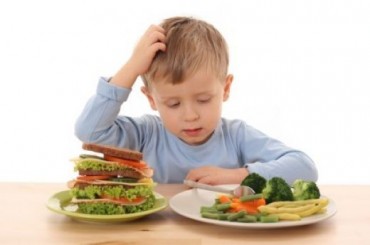As a mother, you are constantly worried about your child’s health and well-being. One of the most common anxieties that parents face is when your toddler seems to turn away pretty much everything that you serve on the plate for him. A faulty diet or loss of appetite among small children is a very common mommy woe. Most often mothers feel that all their efforts of cooking delicacies for their tiny munchkins tends to go down the drain owing to their appetite loss. Well, mommies must bear in mind that most kids turn out to be fussy eaters and convincing them to lick their platters clean is no easy task.
It definitely is upsetting when your little toddler creates a fuss about eating meals on a steady basis. But fret not; a loss of appetite or an appetite slump is a common problem in little kids. If you have been facing the same with your child, below mentioned are guidelines on how to tackle the same:
What exactly is a loss of appetite?
An appetite slump in toddlers also medically termed as psychological anorexia refers to the absence of hunger or the want to eat anything. This commonly occurs in kids between the ages of 2 and 6 years. This typically happens owing to the fact that a child’s rate of development and growth slows down considerably post the first year. During the first year, your child may put on about five to six kilos. Nevertheless, between 1 to 6 years of age, he or she may fail to gain this much weight. It is possible for them to even go for 3 to 4 months without displaying any significant weight gain. The child’s brain has an appetite centre that is said to regulate the consumption of edibles and directs the child to consume as much as he or she necessitates to grow and preserve energy. Due to the fact that he is not growing at a fast pace anymore, he may possibly have a frailer appetite which nothing but makes them not want to eat.
Why do most children tend to suffer from ‘appetite slump’?
Illness: If your child is suffering from any kind of illness, this can sometimes lead to loss of appetite. If your baby has been suffering from a sore throat, rash, is running a temperature or has any other symptoms which is making your child turn away from food, you must immediately seek medical help.
Depression or stress: Apart from sickness, there are many other causes of loss of appetite in children. These may include sudden alterations like the loss of a loved one. This has a great possibility to lead to stress and anxiety and can accordingly trigger an absence of hunger in your tiny tot.
Consumption of junk food between meals: If your toddler has a habit of munching onto junk edibles in between meals, then his desire to eat is surely going to drop down during mealtimes. This unhealthy eating pattern can also lead in developing various health snags like childhood obesity to name a few.
Excessive fluid intake: Drinking too many fluids like juice or other liquids apart from water, in between and while eating meals can cause to a loss of appetite as your child’s stomach will appear to be full. Kids who are anaemic also tend to feel fragile, thus experience lowered or an absence of appetite.
An absence of physical activity in the child: If your toddler fails to perform any form of physical activity and rather spends a lot of time in front of the television or just sits ideally doing nothing, it can majorly hamper the process of digestion. This can also cause an appetite slump in kids.
- How can parents boost the child’s appetite?
- Allow your toddler to decide the quantity of food. Parents must depend on the child’s appetite centre present in his brain and let them choose how much food they would want to consume.
- To boost the child’s hunger, it is very essential for parents to limit his snacks to just 2 per day. Refrain from letting them munch over more than two snacks per day in between mealtimes. This is because binging up on snacks before meals will make them full, thus decreasing the child’s appetite during mealtimes.
- You must keep a watch on the fluid intake. It is advisable for them to sip on to not more than 480 ml of fluids per day. Fluids like juices are full of calories and have a possibility of making your child feel full, thus killing appetite.
- To make meals more interesting for your fussy eater, ensure you serve them with different varieties. Parents can consider rotating the menu and keep adding on new and interesting recipes. This will also give you a clear idea of your child’s food preferences and dislikes.
- You can further get creative with the food presentation to boost eating habits in children. You can make food fun with creative shapes and hues or even serve food on fancy little plates and cutlery to bring about an interest in kids.
- Always consider serving small portions to kids. Smaller portions are less overwhelming to look at and to consume, which means your toddler will be able to finish off his plate of food faster than if you would serve him huge portions of food. You never know, your child may also ask for a second serving.
- It is very important to fix proper mealtimes. Having a fixed food timing can normalize your toddler’s appetite and prepare him for meals.
- Making mealtimes a fun and interactive session can facilitate your toddler to look forward to having his food and on time without skipping any meals. Never allow your child to eat meals in front of the television.
- Never force feed or make use of food as a reward or punishment. This will further lead to a slump in his appetite.
- Always stay away from discussing or complain about your child’s faulty eating habits in front of your child. This may nothing but worsen the problem for them.
- You can consider giving your child daily vitamins – If you are worried about your child’s daily food intake, you can check with a doctor about small doses of vitamins for your child.
When to Consult the Doctor for a Slump in your toddler’s Appetite?
- If you notice your baby has been losing too much weight
- If your child has not gained any weight in the past 6 months.
- Your child has been suffering from conditions like diarrhoea or fever.
- Your toddler vomits post the intake of certain foods.
- Your toddler has not urinated in over 8 hours.
It is likely that most often, parents or guardians tend to misinterpret the child’s fluctuating requirements to be due to a loss of appetite. This is when they tend to fuel the snag further by compelling the child to eat or start complaining that their child doesn’t eat properly. It is vital that you show patience if your toddler is not consuming the normal number of edibles that he usually eats. Always keep a check whether his height and weight are suitable and fitting for his age and you will actually notice that there is little to be worried about.
























































Comments